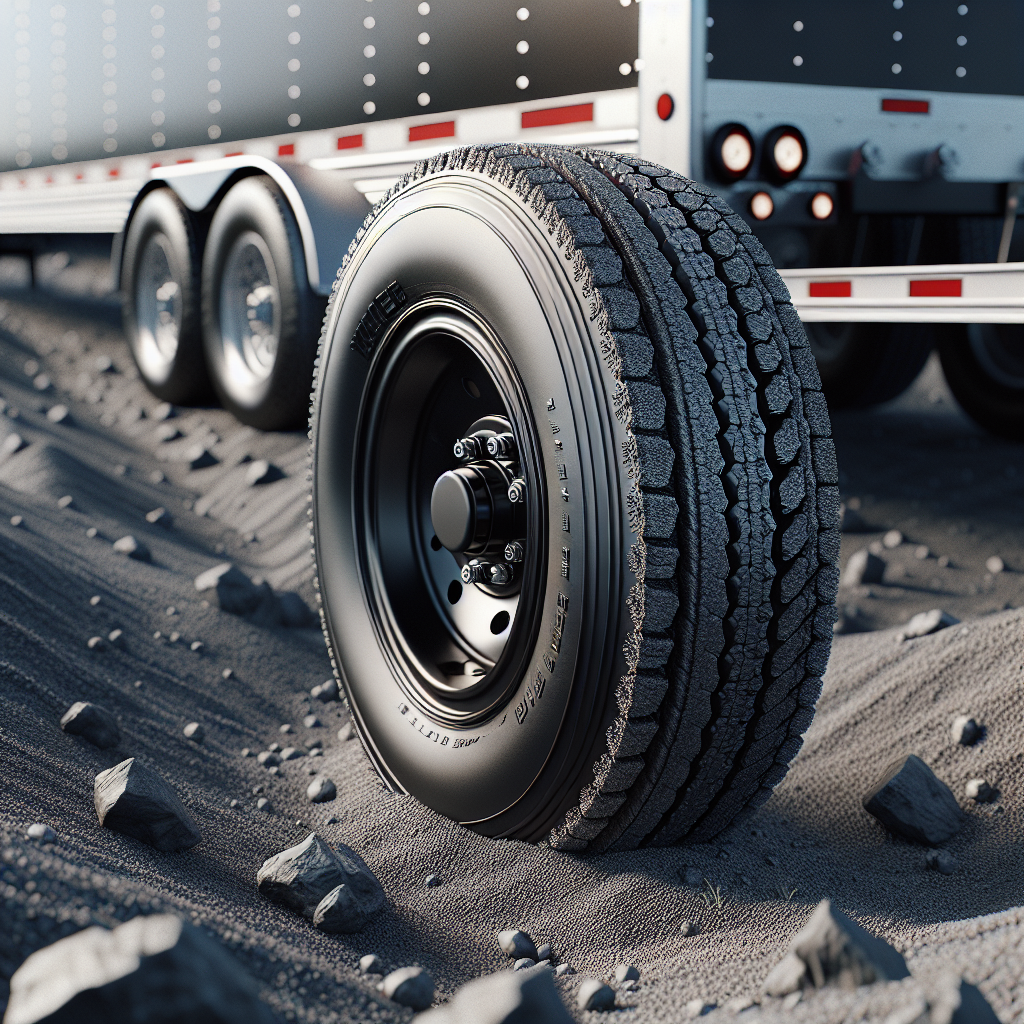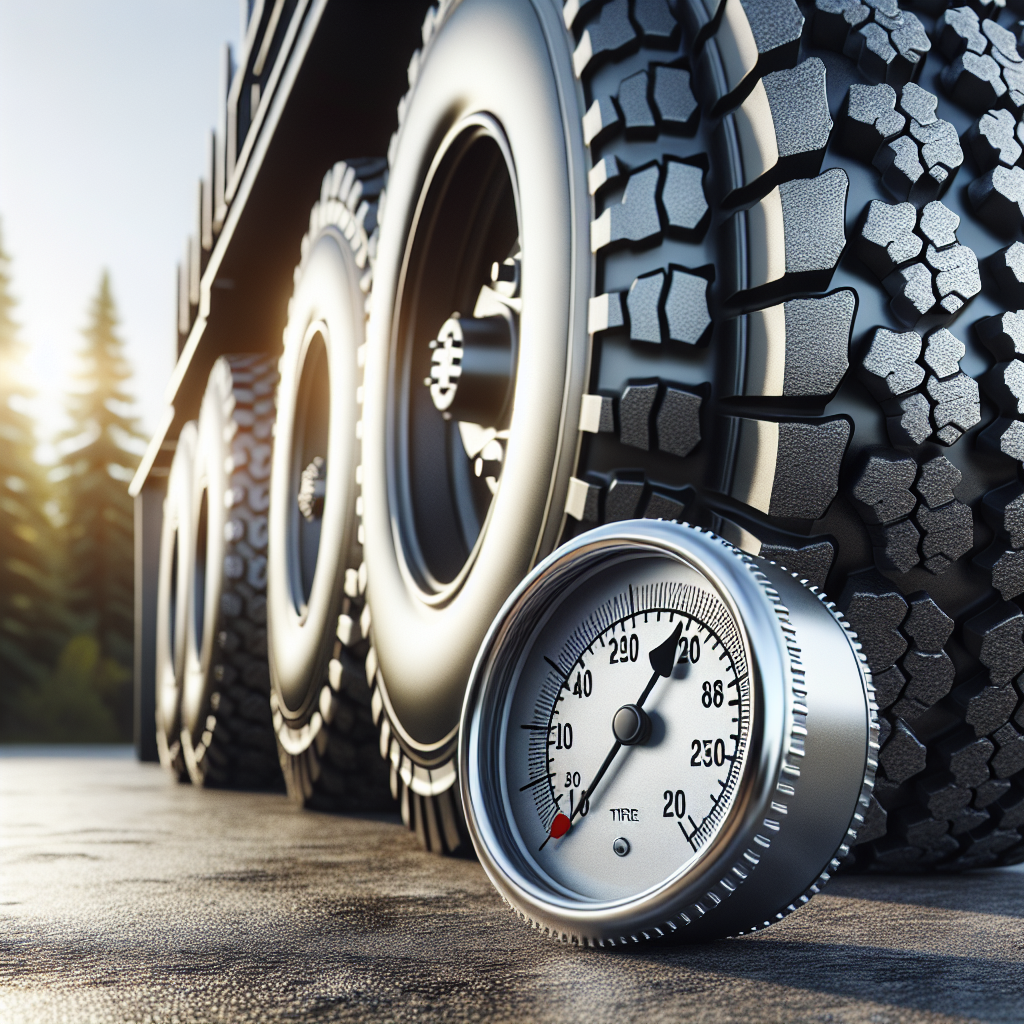Maintaining proper air pressure in your trailer tires is crucial for optimal safety and performance. When it comes to understanding how much air pressure should be in a trailer tire, it's essential to recognize that inadequate pressure can lead to a variety of issues.
Under-inflated tires can cause:
- Increased tire wear: Tires that are not sufficiently inflated wear unevenly, leading to premature replacement.
- Poor handling: Low pressure affects the stability of the trailer, making it harder to control during towing.
- Heat buildup: Insufficient air pressure generates excess heat, which can lead to blowouts and catastrophic tire failure.
On the other hand, over-inflation poses its own risks:
- Reduced traction: Over-inflated tires can lose surface contact, reducing grip and increasing stopping distances.
- Increased risk of damage: Tires may become more susceptible to road hazards such as potholes and debris.
To ensure your trailer operates smoothly and safely, always refer to the manufacturer’s guidelines for the appropriate tire pressure. Regularly checking your tire pressure can save you from unwanted breakdowns and enhance your towing experience.
Tow with peace of mind, knowing that trailerwatchdog is standing guard.
Recommended Air Pressure for Various Trailer Types

Understanding the recommended air pressure for various trailer types is essential for maximizing performance and safety. Different trailers have distinct weight capacities and load requirements, which directly impact the optimal tire pressure.
Here’s a breakdown of recommended tire pressures based on common trailer categories:
- Utility Trailers: Typically designed for lighter loads, the recommended tire pressure ranges from 30 to 40 PSI. Always check the sidewall for specifics.
- Boat Trailers: For trailers designed to carry boats, maintaining a pressure of 40 to 50 PSI is crucial, especially when carrying heavy loads to ensure stability.
- Travel Trailers: These larger trailers often require higher pressures, usually between 50 to 80 PSI, depending on the weight and design. Refer to the manufacturer’s specifications for guidance.
- Horse Trailers: Given their unique design and load distribution, horse trailers generally require tire pressures between 50 to 70 PSI to ensure safe travel.
Regardless of the trailer type, it’s vital to conduct regular checks and maintain the air pressure within the recommended range. This not only helps in improving fuel efficiency but also enhances the overall safety of your journey.
How to Measure Trailer Tire Air Pressure Accurately

To ensure optimal performance and safety, knowing how to measure trailer tire air pressure accurately is essential. Proper tire pressure directly impacts handling, fuel efficiency, and tire lifespan.
Follow these steps to measure your trailer tire air pressure:
- Gather the Right Tools: You will need a reliable tire pressure gauge. Digital gauges are often more accurate and easier to read than analog ones.
- Check Tires When Cold: Tire pressure should be measured when the tires are cold, ideally before the trailer has been used or after sitting for at least three hours. Heat from driving can increase air pressure, leading to inaccurate readings.
- Remove the Valve Cap: Carefully unscrew the valve cap from the tire’s valve stem. Keep it in a safe place to avoid losing it.
- Attach the Pressure Gauge: Firmly press the tire pressure gauge onto the valve stem. You should hear a brief hiss of air as the gauge takes a reading. Make sure to create a tight seal to avoid air leaks.
- Read the Gauge: Note the reading on the gauge. Compare it with the recommended pressure for your specific trailer type. If the reading is lower than recommended, you will need to add air.
- Add Air if Necessary: If the pressure is low, use an air compressor to inflate the tire to the recommended PSI. Recheck the pressure after adding air to ensure accuracy.
- Replace the Valve Cap: After measuring and adjusting the tire pressure, screw the valve cap back on securely to prevent dirt and moisture from entering.
By regularly checking and adjusting your trailer tire air pressure, you can significantly enhance safety and performance on the road.
Signs of Improper Air Pressure in Trailer Tires

Recognizing the signs of improper air pressure in trailer tires is crucial for maintaining safety and performance while towing. Both over-inflated and under-inflated tires can lead to significant issues, including blowouts and decreased handling.
Here are some key indicators that your trailer tires may not have the correct air pressure:
- Uneven Tire Wear: Inspect the tread on your tires. If you notice that one side is wearing more than the other, this could be a sign of improper air pressure. Over-inflation often causes wear in the center of the tire, while under-inflation leads to wear on the edges.
- Poor Handling: If your trailer feels unstable or sways excessively while towing, it may be due to incorrect tire pressure. Properly inflated tires help maintain traction and control.
- Frequent Blowouts: Tires that are consistently over-inflated are more prone to blowouts, especially when encountering potholes or road debris. If you experience blowouts frequently, check your tire pressure.
- Flat Spots: If your tires have flat spots or appear to be squished, it could indicate under-inflation. This can lead to further damage and reduced performance.
- Difficulty in Maintaining Speed: If your trailer struggles to maintain speed or feels heavier than usual, it may be time to check the tire pressure. This can impact fuel efficiency and towing capabilities.
By being vigilant about these signs, you can take proactive measures to ensure your trailer tires are functioning optimally, enhancing your overall towing experience.
Tips for Maintaining Ideal Trailer Tire Air Pressure
Maintaining ideal air pressure in your trailer tires is essential for safety, performance, and longevity. Here are some practical and effective tips to help you keep your trailer tires in optimal condition:
- Regular Inspections: Make it a habit to check your tire pressure at least once a month and before long trips. Use a reliable tire pressure gauge to ensure accuracy.
- Follow Manufacturer Recommendations: Each trailer tire has a recommended air pressure specified by the manufacturer, usually found on the tire sidewall or in the owner’s manual. Always adhere to these guidelines for optimal performance.
- Adjust for Load: If you're loading your trailer with cargo, remember that additional weight can affect tire pressure. Inflate tires accordingly based on the load you’re carrying to maintain safety and stability.
- Monitor Temperature Changes: Tire pressure can fluctuate with temperature changes. Check your tire pressure after the trailer has been parked for a while, as driving can heat up the tires and temporarily increase pressure.
- Use Nitrogen Inflation: Consider using nitrogen instead of regular air for inflation. Nitrogen has larger molecules, reducing the rate of pressure loss and helping maintain optimal tire pressure longer.
- Invest in a Tire Monitoring System: Implementing a tire monitoring system can provide real-time data on tire pressure and temperature. This technology allows you to address issues before they escalate into serious problems.
By following these tips, you can ensure that your trailer tires remain properly inflated, enhancing safety and performance while on the road.
The Role of Trailer Monitoring Systems in Tire Safety

The integration of trailer monitoring systems into your towing experience significantly enhances tire safety and overall trailer performance. These advanced systems are designed to provide real-time data on various aspects of your trailer, particularly focusing on tire pressure and temperature.
Here’s how these systems contribute to tire safety:
- Real-Time Monitoring: Trailer monitoring systems continuously track tire pressure and temperature, alerting you immediately if there’s a deviation from the optimal range. This proactive monitoring helps in preventing blowouts and tire-related accidents.
- Data Analytics: Many systems offer data analytics features that allow you to review historical tire performance. Understanding patterns can help you make informed decisions about maintenance and necessary tire replacements.
- Alerts and Notifications: Receive instant notifications on your smartphone or dashboard when tire pressure drops or temperatures rise beyond safe limits. This feature ensures you can take corrective action before a minor issue escalates into a catastrophic failure.
- Enhanced Safety: By keeping a constant check on tire conditions, trailer monitoring systems enhance your safety on the road. A well-monitored trailer not only protects your investment but also safeguards lives.
Investing in a trailer monitoring system like TrailerWatchdog ensures that you have a reliable guardian looking out for your trailer’s tire safety. Tow with peace of mind, knowing that TrailerWatchdog is standing guard.








